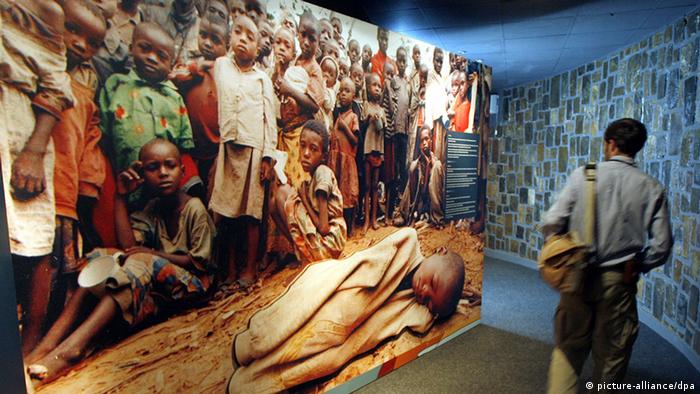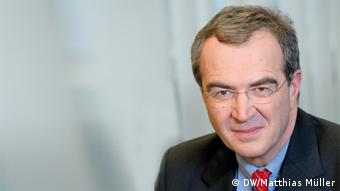Welcome
....to JusticeGhana Group

JusticeGhana is a Non-Governmental [and-not-for- profit] Organization (NGO) with a strong belief in Justice, Security and Progress....” More Details
DW's editor-in-chief: 'Rwanda was a country with deep scars'
- Details
- Parent Category: Africa and The World
- Category: DateLines
- Created on Tuesday, 08 April 2014 00:00
- Hits: 3614
DW's editor-in-chief: 'Rwanda was a country with deep scars'

DW: Alexander Kudascheff, shortly after the genocide, you reported from Rwanda for Deutsche Welle. What were your first impressions at the time?
Alexander Kudascheff: This may sound odd, but as I was entering Rwanda by car, I thought to myself, "What an unbelievably beautiful country." To me Rwanda looked like the Black Forest. I got out of the car to admire the rolling hills and splendid forests, but all of a sudden I found myself staring down the barrel of a gun. Standing in front of me was a child soldier between 9 and 11 years old. I was still a smoker at the time, and I asked myself, "How do I calm the boy – should I give him a cigarette or not?" I started talking to him, and he told me that rebel leader Paul Kagame [now Rwanda's president] had driven through the area a few days ago. And now it was the boy's duty to stand guard. I congratulated him for having been entrusted with such an honorable task, decided not to offer him a cigarette, and continued my journey.
 Did you see any more child soldiers?
Did you see any more child soldiers?
I came across quite a few. But they weren't wearing uniforms and you couldn't tell whether they belonged to any unit. They were simply running around, and I assumed that some of them had found weapons left behind by fleeing Hutu militias. Rwanda was a heavily armed country at the time and many of the weapons were in the hands of children.
You had a Ugandan driver and were heading toward Kigali, the Rwandan capital. What was your trip like?
We drove from Uganda to Kigali. The only hotel room we could find was one without windows, water, electricity or light. The standard price was one dollar. The driver and I shared the room.
We drove through the entire country and across the border to Goma in the eastern Democratic Republic of Congo [then Zaire]. We wanted to see what had become of the refugees. At the time, most foreign journalists were not in Rwanda but covering what was called the refugee tragedy in Goma. And what interested those in Rwanda was mainly the search for Hutu murderers who had gone into hiding.I tried to interview Paul Kagame but the only response I ever got was, "Tomorrow, Monsieur, tomorrow."
We went all over the country, and to this day one thing has left a lasting impression on me: that Rwanda is so unbelievably beautiful and that I found the people incredibly likeable, even in the shattered and vulnerable state they were in.
You found the people there to be so likeable – something that many travelers have remarked on. And yet during the genocide, many Rwandans were capable of the most appalling cruelty. How did you deal with this?
We probably only discovered those who were victims. After all, it is also hard to understand how the Germans were capable of sending 6 million people to the gas chambers. I think that at the time I perceived it to be some kind of archaic eruption. And when it was over, people were themselves again.
Rwanda was a country with deep scars. You would drive past piles of skulls and hear people talking about how their relatives died or were massacred. Wherever you were, you noticed that people wanted to talk about what they had experienced. You saw what was going on in these people, this mixture of joy and shame over having survived as well as fear of the future. What lies ahead for us?
During the genocide, however, the eyes of the world were not on Rwanda. In retrospect, as a journalist, too, one has to be ashamed about having paid so little attention to what was happening there. But those in positions of responsibility at the time have even more cause to be ashamed: primarily the UN, which so miserably failed to act. But it also applies to others: to the West, to NATO and especially to Belgium, the former colonial power. The Belgians had longstanding ties to Rwanda, and they have also asked themselves: Where did we go wrong? Why weren't we capable of stopping this genocide or at least impeding it?
Paul Kagame has been Rwanda's president since 2000. He has been trying to promote reconciliation, among other things by banning people from defining themselves along ethnic lines. What do you think about this approach?
I agree with the basic idea not to think in terms of ethnic groups. This way one moves away from racist traditions. But is this something that can be dictated from the top down? The socialist countries tried that over and over but without success, because the minute socialism was gone, all the nationality problems re-emerged.
I would take a nuanced approach to Paul Kagame. On the one hand, his economic policies were quite successful. On the other hand, he is a leader from one of the ethnic groups, and that is not very easy for the other to accept. In an interview I conducted with Kagame five or six years ago, he struck me as someone who was at peace with himself. He seemed to be someone who probably sensed that he also made mistakes, but believed that his policies were essentially correct. Whether this is the case and whether the two ethnic groups have overcome their differences is something that will probably only become clear in the period after Kagame.
When confronted with the genocide in 1994, the international community failed miserably. From this failure, the principle of a responsibility to protect arose. How well is the international community meeting this responsibility today?
It is not living up to this responsibility. Incidentally, parallel to the genocide we also had the conflict in the Balkans where we asked ourselves exactly the same questions. Former NATO Secretary-General Manfred Wörner's famous words following a sniper attack on the market square in Sarajevo - "It is time to act" – have become ingrained in many people's minds.
Morally, I think there is nothing to debate here. Everything has to be done to help those people. We also asked ourselves this question - looking back on our past: Should the Allies have bombed the railway tracks that led to Auschwitz?
If you asked me, as a rational, journalistic observer, for an honest opinion on whether I thought interventions would succeed and make sense in the long run or as nation-building measures, I would have to say, 'No, I don't believe they would.' You can go in for a short time to try to calm the situation, try to stop the volcano of murderous rage. But then you have to get out as quickly as possible, so that those living in this volcano learn to deal with the situation themselves. In the beginning things went well in Afghanistan, also according to the aid workers, but sometime around 2004 or 2005 the situation was reversed.
We have interventions that failed completely, like in Somalia, partly failed ones like in Bosnia and some where the outcome is still unclear, like in Kosovo. We cannot yet say how things will turn out in Central African Republic or in Mali.
Later the international community promoted an investigation of the genocide and the restoration of justice through the International Criminal Tribunal for Rwanda. In Germany, too, and even in France, genocidaires are being tried. What do you think about these belated attempts at coming to terms with what happened?
I believe it's good for this world that the people responsible for crimes of this magnitude have no reason to believe they can get away unpunished. That's why, for example, I think a 90-year-old former concentration camp guard at Auschwitz should still be tried. He once forced even 2-year-olds into the gas chamber – so for me his age doesn't count. Therefore, I think the idea behind the international criminal tribunal that the world will not let someone get away with such crimes is correct. Whether the tribunal is successful or not is another matter. After all, many of these criminals moved about freely for years within the international community's reach. Many weren't tried until their position had become weaker. And others were never prosecuted at all.
Dr. Alexander Kudascheff is Deutsche Welle's editor-in-chief. Before January 2014, he headed DW's Berlin studio. As a reporter, Alexander Kudascheff travelled to many regions of the world for DW. In 1994, he reported from Rwanda.
Interview: Dirke Köpp.
Date 07.04.2014
Author Dirke Köpp / gu
Editor Susan Houlton
Source: Deutsche Welle




